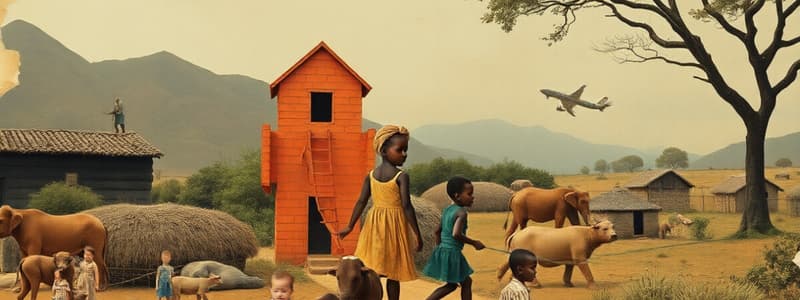Podcast
Questions and Answers
Why did Naledi and Tiro turn onto the big tar road?
Why did Naledi and Tiro turn onto the big tar road?
- It led in the direction of Johannesburg. (correct)
- It provided better shelter from the sun.
- It was less dusty than the village road.
- It was a shortcut to their destination.
Naledi and Tiro had enough money to buy train tickets to Johannesburg.
Naledi and Tiro had enough money to buy train tickets to Johannesburg.
False (B)
What did Naledi and Tiro do to ease the burden of their journey and break the silence?
What did Naledi and Tiro do to ease the burden of their journey and break the silence?
They sang
Naledi insisted they continue walking until they reached the top of the long, low ______ ahead.
Naledi insisted they continue walking until they reached the top of the long, low ______ ahead.
Match the following items with their corresponding descriptions from the text:
Match the following items with their corresponding descriptions from the text:
Why were Naledi and Tiro afraid of policemen?
Why were Naledi and Tiro afraid of policemen?
Naledi and Tiro stopped to look in shop windows as they walked through the strange town.
Naledi and Tiro stopped to look in shop windows as they walked through the strange town.
What were the two lines of dusty red earth caused by?
What were the two lines of dusty red earth caused by?
Naledi and Tiro remembered the stories about a ______ farm where their uncle was sent.
Naledi and Tiro remembered the stories about a ______ farm where their uncle was sent.
What was the primary purpose of the 'pass' mentioned in the text?
What was the primary purpose of the 'pass' mentioned in the text?
The railway line ran toward Cape Town.
The railway line ran toward Cape Town.
What was the weather like when they ate their sweet potatoes?
What was the weather like when they ate their sweet potatoes?
The children knew that, if a policeman stopped them, he would want to see their ______.
The children knew that, if a policeman stopped them, he would want to see their ______.
What was the significance of the older children's song about the policeman?
What was the significance of the older children's song about the policeman?
Singing made their feet light.
Singing made their feet light.
Where did their uncle leave his pass?
Where did their uncle leave his pass?
The children walked past the ______ windows.
The children walked past the ______ windows.
What did Naledi and Tiro eat before starting to walk again?
What did Naledi and Tiro eat before starting to walk again?
Naledi was more tired than Tiro during the walk.
Naledi was more tired than Tiro during the walk.
The grass was dry and ______.
The grass was dry and ______.
Flashcards
What is a pass?
What is a pass?
Documents required by police to restrict the movement of Black people.
Why did Naledi and Tiro walk faster?
Why did Naledi and Tiro walk faster?
Towns are dangerous due to potential police encounters; strangers are viewed with suspicion.
Why do Naledi and Tiro sing?
Why do Naledi and Tiro sing?
They use this to break the monotony and fear of their journey.
What is a prison farm?
What is a prison farm?
Signup and view all the flashcards
What is the road like?
What is the road like?
Signup and view all the flashcards
Why won't Naledi stop to eat?
Why won't Naledi stop to eat?
Signup and view all the flashcards
"We don't have even one cent."
"We don't have even one cent."
Signup and view all the flashcards
Study Notes
- The children leave their village and follow a track made by car tires.
- The destination is Johannesburg, eastward on the big tar road.
- They walk along the railway line.
- Tiro expresses the desire to have money for train tickets, but they have none.
- Naledi remains optimistic about reaching the destination.
- The tar road burns their feet, leading them to walk on the side.
- The grass is dry and scratchy.
- Cars and trucks pass occasionally, leaving them alone again.
- Naledi starts singing to pass the time.
- Tiro expresses hunger, but Naledi wants to reach the top of the hill before they stop.
- They rest at the top of the hill.
- They eat sweet potatoes and drink water.
- They observe the long road stretching ahead.
- Naledi urges them to continue.
- Tiro is tired.
- The sun is past midday, and they haven't traveled far.
- They walk steadily and sing to break the silence.
- They become afraid of policemen in a small town.
- Policemen are perceived as dangerous from stories.
- Older children at school made up a song about policemen and passes.
- Grown-ups talk about the "pass" required for travel or job changes.
- The children know someone who had trouble with the pass.
- Naledi and Tiro remember their uncle's story about being sent to a prison farm for not having his pass.
- They share a silent fear as they walk through the strange town.
- They avoid looking in shop windows and hurry along the main street to leave the town.
Studying That Suits You
Use AI to generate personalized quizzes and flashcards to suit your learning preferences.




